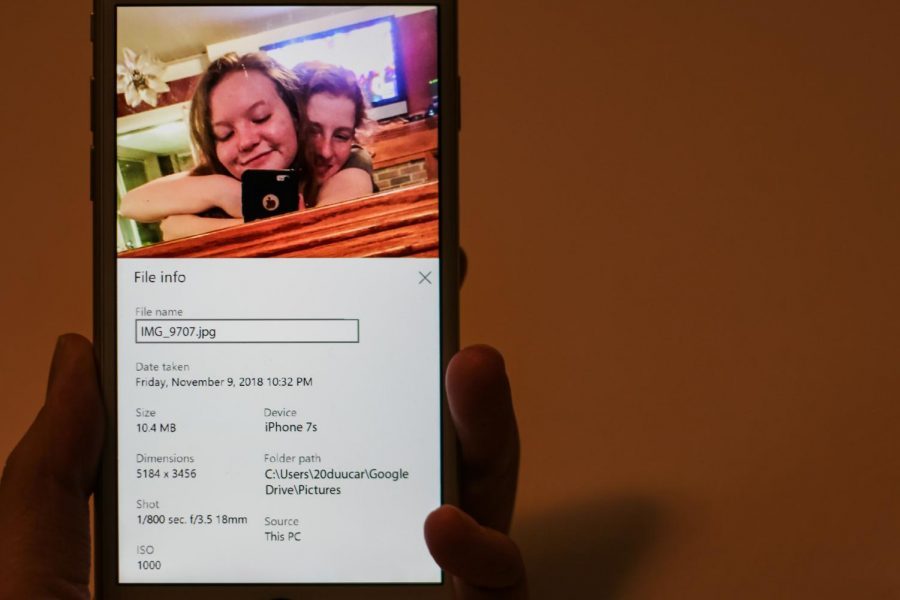Plugging into Technology’s Impact
Online interactions today may be leading to future consequences.
March 21, 2019
To gain a snapshot of teenage life, The Washington Post followed Katherine Pommerening of Virginia, as she woke up to open Instagram on her birthday. She spends time on her phone when she can at school and on the drive home. 95 percent of teenagers have a smartphone, according to the Pew Research Center. People of all ages use them to watch videos or listen to music at the press of a button. They can connect on social media apps like Instagram and Snapchat. Nearly half are almost constantly online. With easy accessibility, young people must grapple with using digital tools effectively for the future. Landa Williams, founder of LandaJob, a marketing and creative talent firm, explained the basis of digital citizenship — using digital media with moral consciousness.
“Thinking before you act is probably the best piece of advice,” Williams said.
Williams explained the lack of control in digital media, stemming from tagging features on apps to digitally permanent messages.
“And maybe youthful indiscretion is one thing, but you do really want to be careful what you’re putting out there because you have no control over where it’s going,” Williams said. “You might pass a note in third grade but when you’ve got photos online in high school — it’s a lot more impactful.”
Digital footprints are permanent data trails, which Williams said, “Once that it exists, then it’ll never be erased.”
Principal of academic affairs Barbara McCormick, who led digital citizenship workshops, referenced an article which explains the importance of safeguarding from future repercussions. Workshops were held during school hours for students and for parents to attend additionally.
“Today, with digitalization, employers judge prospective students or employees for their social media profile,” the article says. “So, it is important to teach students how to create online personas that project positive and constructive image.”
The article explained the need for digital citizenship to be integrated into school curriculum, “due to the fact that a lot of young kids embrace technology every day without examining the consequence of implementation.”
Senior Lucy Whittaker also explained the role digital media plays in the future, especially for young people applying for jobs or colleges.
“Employers can use it as a testament to a person’s character, what their passions are and how they present themselves,” Whittaker said. “I also think that our digital footprints can play a role in college admissions, especially if applying to more selective schools or programs.”
Whittaker also referenced “cancel culture,” in which people are no longer supported by others after finding problematic evidence, typically on social media — where information also has a digital footprint. People are “cancelled” when information is made public that draws heavy criticism and shunning.
In February 2019, photos surfaced of Virginia governor Ralph Northam, in blackface and with Ku Klux Klan hoods from a school yearbook of 1984. This caused public outrage and calls for his resignation.
According to CNN, after apologizing Northam said, “I recognize that it will take time and serious effort to heal the damage this conduct has caused. I am ready to do that important work.”
Sparking massive debate, politicians have weighed in on the issue, sharing their opinions on Northam’s photo. In a Washington Post article, Virginia Senators Mark Warner and Tim Kaine as well as Representative Bobby Scott shared their views on Northam’s decision not to resign.
“We called Governor Northam to tell him that we no longer believe he can effectively serve as Governor of Virginia and that he must resign,” the leaders said after a news conference. “He should step down and allow the Commonwealth to begin healing.”
Whittaker explained her reaction to Northam’s photo, in the context of “cancel culture.”
“Without the internet that incident probably wouldn’t have blow up like it did, or it may not have even been discovered,” Whittaker said.
McCormick explained the reasoning for educating high school students on digital citizenship as a way to prevent issues from escalating.
“If we’re proactive about these topics, students can identify and solve problems online before they escalate,” McCormick said. “It’s impossible to know if all of the students are behaving appropriately online all the time. Online issues spilling over into the school community lessens, hence creating a safer environment for our students.”
Williams described the connection between preserving memories digitally today and before the digital age, explaining how it is impacted by the digital age.
“Even though we have all the new media, the rules are still pretty much the same as they always were,” Williams said. “You don’t want anything in print that you wouldn’t want the world to see.”
Whittaker explained the importance of digital citizenship for the future, in providing a possible solution to preventing issues.
“We can have the best technology and the most tech in the world, but if no one knows how to use it responsibly — it can do more harm than good,” Whittaker said.
Whittaker described how online interactions can also generate positive awareness.
“For example, the #MeToo movement really took off online and in my opinion was a positive reaction,” Whittaker said. “I think because it was on the internet, it gave people the courage to speak up because they knew that there was a community to back them up. The internet has been able to shed light on whatever topic is pertinent at that time,” Whittaker said.
Whittaker also added how she sees the future of digital interactions changing.
“I think that over time people will continue to learn about different communities that have presences online and learn to be more understanding and empathetic towards them.”
